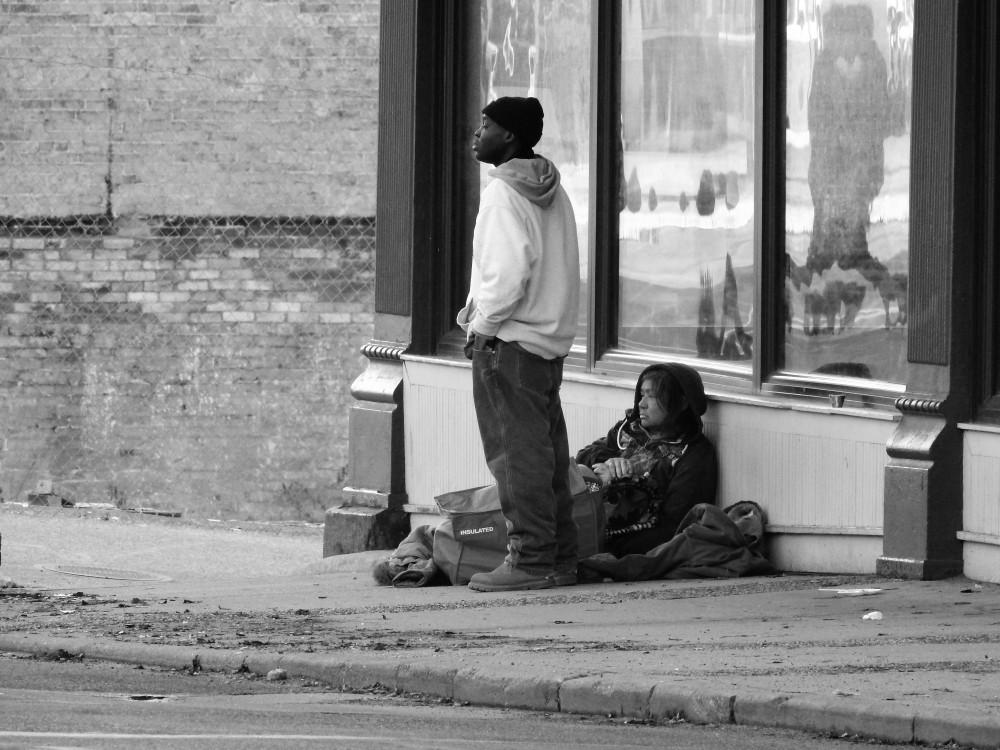GVSU Seidman College of Business to host poverty simulation

GVL / Courtesy – John Rothwell Homeless in downtown Grand Rapids, as pictured on Saturday, Jan. 21, 2017.
Feb 27, 2017
Partnering with Access of West Michigan, the Grand Valley State University Seidman College of Business will host a poverty simulation with 75 participants. The simulation workshop is designed to provide insight into what living in poverty is like.
The workshop will take place Monday, Feb. 27, at the L. William Seidman Center in Room SCB 1008 from 3 p.m. to 5:30 p.m.
Access of West Michigan staffers will create a community of stores and agencies that families will interact with during the simulation. Participants will role-play as different types of families living in poverty for four 15-minute “weeks.” During their “month” in poverty, they must maintain their housing and pay their bills, all while making sure they take care of their families and deal with unexpected situations that may occur. The goal is to imitate real-life situations.
Brenda Nichols, the poverty education director for Access of West Michigan, spoke about the history of this organization.
“Access of West Michigan has been around since 1981,” she said. “We’ve done over 300 simulations since then. We do about 25 a year. It takes 50 people to hold a simulation with a maximum of 75.
“The point of a simulation is to educate people and make them aware of the struggles that people have and getting out of poverty.”
Nichols also noted that her staffers will have resource people around the room during the workshop who are themselves in poverty or have lived in poverty and will share their stories. She said she hopes participants gain “understanding and sympathy” from the experience.
Yalonda Ross-Davis, professional development manager in the Seidman undergraduate programs, works with students on their professional development.
“We have a four-tracks program that we walk students through as a part of their professional development,” she said.
The four tracks under this program are identity communication and professional skills, strategic career development, leadership ethics and integrity, and global and diverse perspective. The poverty simulation workshop falls under the last track.
“When our students leave Grand Valley, they are very knowledgeable with textbook information and with tools and the knowledge to move themselves further in the work world in that regard,” Ross-Davis said.
She also said sometimes students need help empathizing with other diverse populations of people, not just with those who visibly look different, but also those who have invisible differences, such as “religion, sexual orientation and social economics,” as a few examples.
Ross-Davis said she has been very fortunate to not have to decide if her money is going to pay for bills, medical expenses or food. She said she has been fortunate enough to cover all three and her wants, too.
“Not everyone who even walks this campus has that same luxury,” Ross-Davis said. “So, it’s important for our students to understand and our staff to understand that there are such diverse pockets of people that we are going to come across. It’s important that we are aware, have a self-awareness to interact with those people always at the highest respect and regard.
“(The simulation workshop) will help students navigate the waters in their professional world with more empathy for all people they come across. It’s super important to know that not everyone is like us.”
“Education is key to awareness, and awareness is key to action,” Nichols said. “You can’t do something if you know nothing about it.”

























